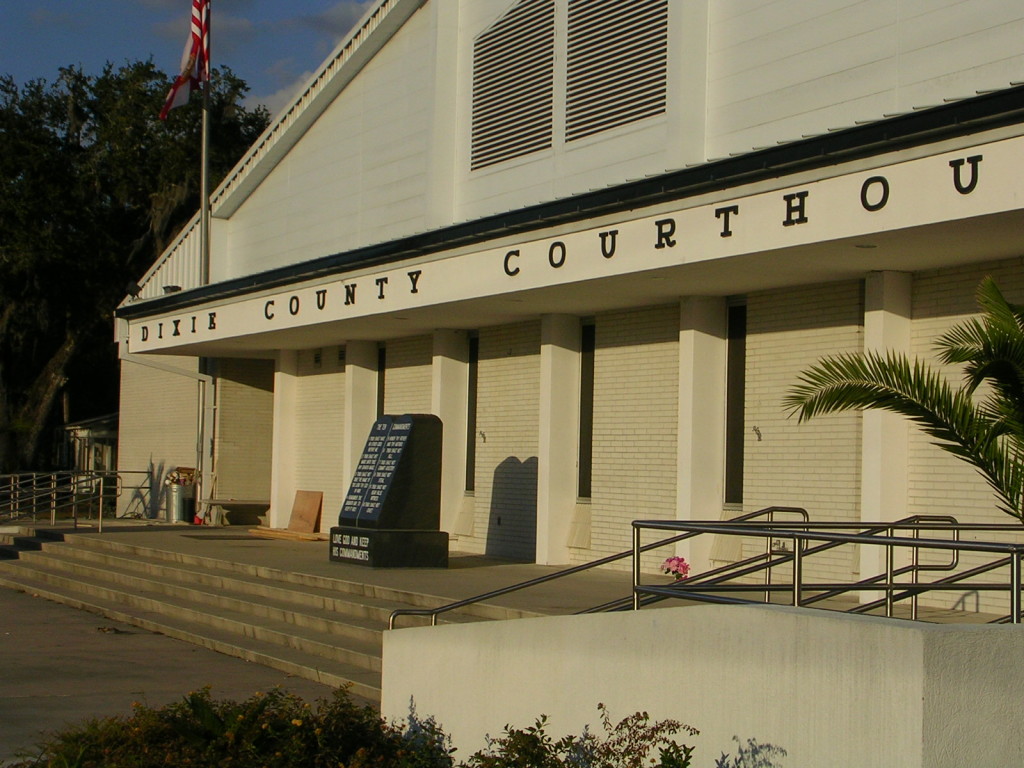 A federal appeals court has thrown out a lawsuit filed by the ACLU, which challenged officials in Dixie County, Florida for displaying a privately-owned monument of the Ten Commandments on the county courthouse steps. The commandments were said to have discouraged a man from buying land in the county due to his offense at their public display.
A federal appeals court has thrown out a lawsuit filed by the ACLU, which challenged officials in Dixie County, Florida for displaying a privately-owned monument of the Ten Commandments on the county courthouse steps. The commandments were said to have discouraged a man from buying land in the county due to his offense at their public display.
The monument at issue is a 5-foot, 6-ton depiction of the tablets of the Ten Commandments, which states at the base, “Love God and keep His commandments.” It was erected at the Dixie County Courthouse in Cross City, Florida in 2006 by local resident Joe Anderson, Jr., who continues to own and maintain the display. On the back of the moment is a plaque that reads, “Placed, owned and maintained by Joe Anderson, Jr.”
A man who is only identified as “John Doe” from North Carolina contacted the ACLU in January 2007 to request assistance in having the display removed. According to court documents, Doe owns a winter home in a nearby county, and was considering purchasing land in Dixie County. He said that when he went to the courthouse to review property records, he “took offense at the display and felt shocked.” Doe further outlined that he was “deeply disturbed that the county openly embraced religious doctrine.”
The ACLU then filed a federal lawsuit against the county, claiming that the Ten Commandments monument violated the Establishment Clause of the United States Constitution. The county retorted by stating that since the display is privately-owned, it cannot be construed as a government establishment of religion. Doe additionally included an affidavit, which alleged that the presence of the monument prevented him from purchasing property in the county.
“Were it not for the presence of the monument on the Dixie County Courthouse steps, we would have continued to look for … property in Dixie County,” he wrote, “And we would do so again immediately if the monument were removed.”
 In July 2011, U.S. Senior District Judge Maurice Paul ruled in favor of the ACLU and Doe, both stating that the display was unconstitutional and that it had caused harm, because “but for the display [Doe would] be looking for, or already have purchased, property in the county.”
In July 2011, U.S. Senior District Judge Maurice Paul ruled in favor of the ACLU and Doe, both stating that the display was unconstitutional and that it had caused harm, because “but for the display [Doe would] be looking for, or already have purchased, property in the county.”
“Despite the actual ownership of the monument, the location and permanent nature of the display make it clear to all reasonable observers that Dixie County chooses to be associated with the message being conveyed,” Paul declared. “As such, the Court finds that the monument displaying the Ten Commandments is government speech and must comport with the Establishment Clause.”
“Removing the monument is the right thing to do. It is not the business of government to promote religious messages about monotheism, idolatry, taking the Lord’s name in vain or honoring the Sabbath,” said Robert Simon, the executive director of the ACLU of Florida.
The ruling was appealed to the 11th Circuit Court of Appeals, which sent the case back to the lower court earlier this month for further analysis. The court stated that there was a dispute over whether Doe truly suffered an “actual injury” from the display and ordered that additional information be obtained, as well as an evaluation of the witnesses.
Last week, the 11th Circuit ruled that Doe lacked standing to file the lawsuit, stating that his testimony was inconsistent regarding what harm the display actually caused him. The court explained that Judge Maurice Paul failed to examine all of the evidence, as Doe’s affidavit conflicted with his deposition testimony.
“The existence of alternative or additional reasons for Doe’s abandonment of his search for property in the county could render Doe’s injury speculative – more ‘hypothetical’ than ‘actual,'” Judge Wilson wrote on behalf of the panel. “Additionally, if other factors caused Doe’s injury, that would undermine the claim that his injury is redressable by removal of the monument.”
The County has been represented by Liberty Council, the legal organization associated with Liberty University in Lynchburg, Virginia.
The 11th Circuit Court of Appeals oversees the states of Florida, Georgia and Alabama. In 2003, the court declared a Ten Commandments display erected by Alabama Supreme Court Chief Justice Roy Moore in the rotunda of the courthouse to be unconstitutional. As a result, District Court Judge Myron Thompson then ordered Moore to remove the Ten Commandments from the courthouse rotunda within fifteen days. Moore refused, but the monument was later moved to a room that was not open for public viewing.
Days later, the Alabama Judicial Inquiry Commission filed a complaint against Moore. His position as Chief Justice was suspended, and he was placed on trial. During his hearing in November 2003, Moore firmly defended his decision to place the Ten Commandments in the courthouse, stating, “Without God there can be no ethics.” However, the assistant state attorney general argued that Moore’s defiance would have an adverse impact on how others treated court orders. “What message does that send to the public, to other litigants?,” he asked. “The message it sends is: If you don’t like a court order, you don’t have to follow it.”
On August 23, 2003, a unanimous panel of the Alabama Court of the Judiciary removed Judge Moore from the bench.
However, Moore is currently on track to regain his seat as Chief Justice of the Alabama Supreme Court, as he is leading in the polls 55 to 33 percent.
With last week’s ruling from the 11th Circuit Court of Appeals, the Ten Commandments monument will continue to stand on the Dixie County courthouse steps.
Become a Christian News Network Supporter...


